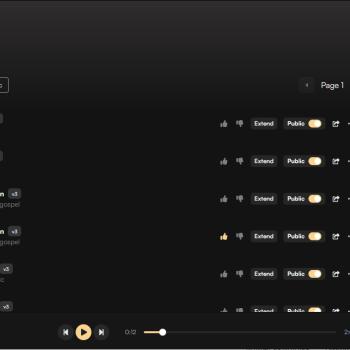I’ve been interested in the religious themes of Tony Banks’ songs both as part of Genesis and on his solo albums for a long time, well before I began work on a book on theology and progressive rock. (Banks’ keyboard playing, as you may be aware, was what led me to take up the instrument). If there is a particular if unrealistic hope I have in connection with the book project, it is that an opportunity will arise to talk with Tony Banks, whether a podcast interview or exchange of emails or anything else. I can easily imagine the mention of “theology” to be offputting, but as anyone who knows me can attest, this is not a sectarian endeavor either to read a particular religious viewpoint into the music of bands that never intended it, or to criticize musicians for views they express. My interest is in the role that things like the Bible and stories of Greek gods played in the musical creativity of Banks and other band members, whose music was described by an East Grimstead paper as being “folk-blues-mystical.”
In the setting of a band it can often be difficult to know who is responsible for particular ideas. However, thanks to a combination of clear album liner credits, interviews, and solo work that exemplifies traits seen in Genesis, it is possible to get a sense of Banks’ contribution not only musically but also lyrically.
It may be simplest to begin with solo work. On his album Bankstatement the song “The Border” features these words:
I don’t wanna hear how wisdom walks beside you
Or how God is inside you again
From the song “Big Man”:
The hot seat’s vacant cos he gave up the reins
He’s kissed his title goodbye run far away
He’s gone to ground in some hole – I don’t know where
All I know is somehow that I’m big man up hereI don’t need your worship
Just need a sacrifice each day
No need to worry
Just want to help in every way
The song’s lyrics are undoubtedly focused on power more generally, in realms of politics and business as much as on a celestial scale. Nonetheless, the choice to relate that to images of a deity enthroned and demanding or not demanding sacrifice is still theological in character.
The song “A House Needs a Roof” explores faith and evidence:
Wandering in a daze
Through a cold mechanical maze
I am lost and confused
I am always the loser
You tell me there’s a place
Where I can be aliveIs it near is it far is it somewhere between
This land you say exists that I’ve never seen
Call me please talk to me tell me the truth
I need to believe like a house needs a roof
Is it strange is it wonderful I need to know
Do you have a picture that you can show
The minute to capture the moment has come
The minute to capture the moment has comeIt’s easy to believe
But less easy to imagine
I’ve grown so used to not coping
Waiting eternally hoping
Wishes come and go
But this one will stay I know
Could the time for adventure be
Just around the corner
“Queen of Darkness” is another interesting song with elements of religion’s more sinister symbols. See also the mention of heaven and forever in “The More I Hide It.”
Closely connected with this is the place of myth and fantasy in Banks’ lyrics. The song “Diamonds Aren’t So Hard” invites the person experiencing mundane hardships to a land with dragons and diamonds. The lyrics are striking not only because of the place of mythology in Banks’ songs, but also because it seizes the opportunity to emphasize that the stuff of human fantasy and dreaming as exemplified especially in film is subject to the realities of human life including growing old.
Banks’ first solo album A Curious Feeling was a concept album, and it too represents a modern myth in which Fate plays a role, and also makes reference to Greek myth in the track “The Waters of Lethe.” A more recent song, “The Serpent Said,” is about modern temptations but uses a biblical image. It is an image that appeared already on the very first Genesis album, which was a concept album related to the Bible, in the song “The Serpent.” The lyrics to that are fascinating, to say the least. On Genesis albums, once they started singling out songwriters separately to a greater extent, Tony Banks is credited as author of “One for the Vine” which tells a fascinating story about false prophets. Banks says of the lyrics, “I liked the cyclical nature of the story: the person in the end becomes the prophet he didn’t believe in and becomes disillusioned.” It remains a longstanding favorite of mine, as does that entire album Wind and Wuthering.
Given the opportunity, I’d simply love to talk with Banks about the role religious and mythological themes play in inspiring his music, why he gravitates towards the types of storytelling in song that includes mythical and fantastical beings and realms, and whether there is in fact any kind of particular vision he has that inspires and is expressed in his songs and his music more generally. I would also want to find out what his role was in the creation of songs by Genesis that explore mythical and religious themes. Whose idea was it to tell the story of Hermaphroditus in “The Fountain of Salmacis”? Did “The Cinema Show” begin as a story of a man and a woman in modern society and then turn to the ancient Greek story of Tiresias, or was the myth the starting point? Did the band members’ views of charlatan preachers change or remain largely the same between “Supper’s Ready” and “Jesus He Knows Me”? The latter reflects Phil Collins’ lyric-writing and their exposure to American televangelists, but there may be significant underlying continuity of perspective nonetheless.
So many interesting questions that I think would be worth asking, given the opportunity, related to such a wonderful history of creative music-making. The above barely scratches the surface of one member of Genesis’ contribution to the realm where music and religious imagery intersect. And that even without much being provided by me in the way of commentary. There’s a lot more to be said on the subject, and I’m looking forward to digging into this more deeply as work on the book progresses.













